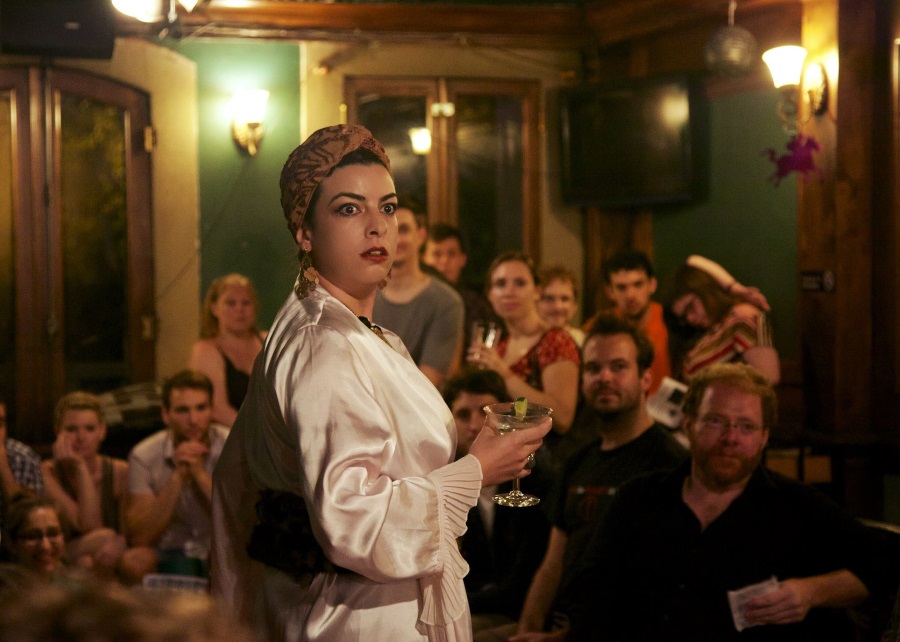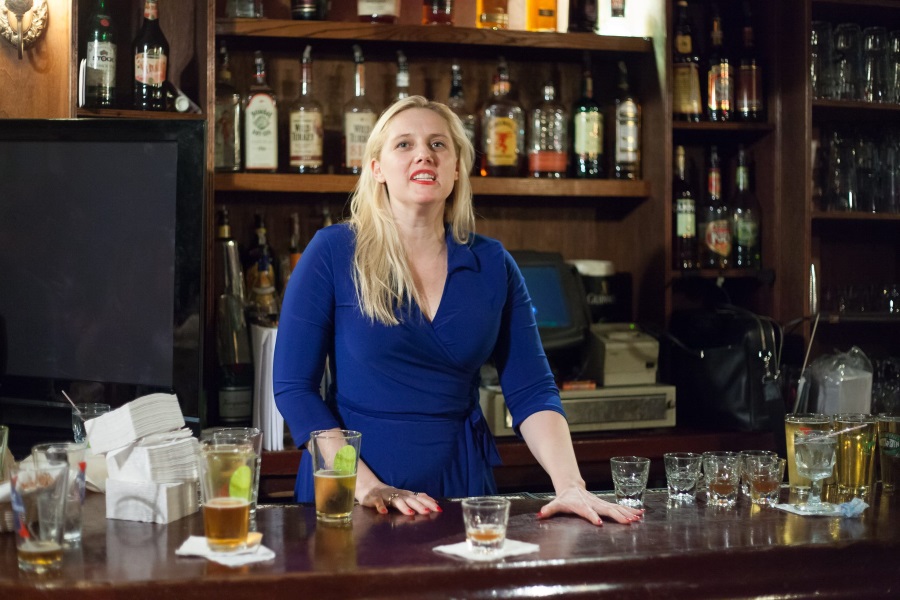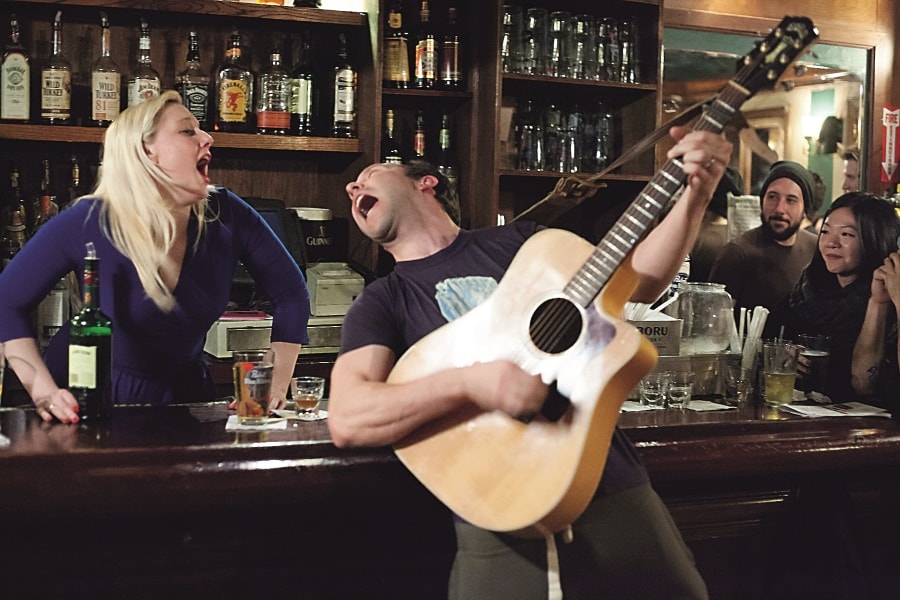Challenge
To give artists an opportunity to work between traditional gigs
Plan
To stage an evening of new short plays every month in a local bar
What Worked
Deeply committed artists, houses packed with adventurous (and tipsy) audience members
What Didn’t
Trying to apply the same strategies year after year
What’s Next
Finding more leaders within the group, launching franchises
Jessi Blue Gormezano is the associate artistic director of New York City’s Project: Theater, but she’s also an actor—which means she knows how it feels to twiddle her thumbs while she’s waiting for her next job. For the last few years, she’s been combatting that limbo state by making sure other people don’t have to languish in it.
“If I get hung up on checking off boxes in my career, I will lose my mind,” she says. “But if I’m really focusing on creating opportunities for artists, that’s what keeps me centered.”
That impulse inspired Our Bar, a project Gormezano has been running under Project: Theater’s banner since 2009. On the first Wednesday of every month, she and her fellow artists mount a group of short plays in an Irish pub on the East Side of Manhattan. That means a guaranteed gig for a lot of actors, not to mention the playwrights who crank out brand new material for every iteration of the show.

“That’s what Our Bar is about,” Gormezano says. “We work with people who want a chance to do their work but aren’t getting opportunities between gigs. They’re saying, ‘I want to be making work while I’m waiting for permission to do other work.’”
After six years—and almost 45 hours’ worth of original material—the project has become a popular fixture, playing to packed houses at a 7 p.m. and a 9 p.m. show. (The late performance is followed by live music.) Along with the artists who get to ply their trade, this is also a boon for Project: Theater, which cultivates a consistent audience even when it’s not producing a mainstage show. The bar profits, too, since in exchange for providing free space, it keeps a portion of ticket sales and all the money spent on drinks.
To some extent, this all works because there’s anarchy involved. Each month’s plays get about a week to rehearse, which brings live-wire energy to the performances. And since playwrights are encouraged to experiment, audiences might see anything from a werewolf comedy to a touching love story. All the drinking helps people stay loose, too. It’s no accident that each $10 ticket comes with a free Bud Light.
Underneath the giddy madness, though, there’s a careful structure in place, and it’s just as crucial to Our Bar’s longevity.
Take the recruitment process. Anyone who wants to participate in Our Bar is welcome, but they have to date the show before marrying it. “You come to see it, you see the environment, and if this is a world you’re interested in exploring, you send us an e-mail,” says Gormezano. “You can’t just send the play you’ve already written or drop off a headshot.”
This trial period weeds out the half-hearted. Gormezano adds that since the only participants who get paid are the Equity actors receiving small stipends, people have to find a more personal reason to get involved.
That buy-in guarantees that the participating artists will follow Our Bar’s other rules. The playwrights, for instance, have to set their shows in a bar, even if they write about Blacula coming through a second-story window. (This has happened.) Explaining that requirement, Gormezano says, “The audience-actor relationship is really at the heart of our show, [so] having Our Bar take place in a site-specific environment with the absence of a fourth wall is integral to strengthening that relationship.”
Speaking of relationships: All Our Bar audiences get to know Jen the Bartender, the only character required to appear every month.
Jennifer Logue, who plays Jen, was a graduate acting student with Gormezano at Florida State University’s Asolo Conservatory, where the seeds for this project were planted. By the time Our Bar found a home at that Irish pub—where Logue herself worked before she went to grad school—Jen the Bartender seemed like an obvious fit. “I knew that someone who represented the ‘voice of the bar’ had to be in every show,” Gormezano says. “Ideally it adds another level of authenticity to the environment.”

Jen the Bartender has also become a direct link to the audience. “I’ve always thought of her as the Greek chorus,” Logue says. “She’s either commenting on the scene, affecting the scene, or in the scene. She’s the very salty, everything-I-want-to-say version of me.”
The performer adds that for her, playing a character that has been written by so many playwrights underscores Our Bar’s communal spirit. “She’s a product of the ensemble for me,” Logue says. She doesn’t even mind if Jen seems contradictory from month to month, quipping, “Jen’s pretty much down for whatever! And she’s beautifully inconsistent, like a lot of human beings.”
As they sit together in a Manhattan restaurant, however, both Logue and Gormezano concede that as Our Bar has gotten bigger and more established, they’ve had to change how it operates. “What hasn’t worked has been thinking that the old systems and processes will serve Our Bar as it evolves,” Gormezano says. “When you’ve got nine people you’ve worked with for years and years and years, like we did at the beginning, then you can sit around and brainstorm and tell stories and trust that a show will emerge. You can’t do that with 20 people.”
Among recent changes, a jury now votes on monthly play submissions, since the load was becoming too heavy for Gormezano to manage alone. Ensemble members are also expected to understand that though they’ll always get something to do, they may not be given a starring role every month. It all depends on the needs of the plays that are selected.
This means, of course, that some plays don’t get chosen and some hopeful actors get one line instead of a star turn. “It took me a long time to get comfortable saying, ‘There isn’t a part for you this month,’” Gormezano says. “Because it was so much about saying, ‘You want to work? Yes, come work.’ So the idea of having to say, ‘No, there isn’t a part’ is the antithesis of what I’m interested in doing.”
Logue adds that, when they didn’t have characters to play, actors found other ways to contribute. “You may not be performing tonight, but you can write, you can showrun, you can market,” she says. “There are other things people can do that strengthen some part of their artistry and make them know that they’re part of it.”
To that end, several Our Bar associates have begun working as producers on the project, while several actors have worked as playwrights and vice versa. As Gormezano considers how to keep the project growing—and even expanding to other cities—she’s dedicated to letting new leaders have a say. “We want to give people in the ensemble more opportunities for creative development,” she says. “If we reach a point where Our Bar can thrive without me being here, then that will mean something has really worked.”
New York City–based arts reporter Mark Blankenship writes frequently for this magazine.


